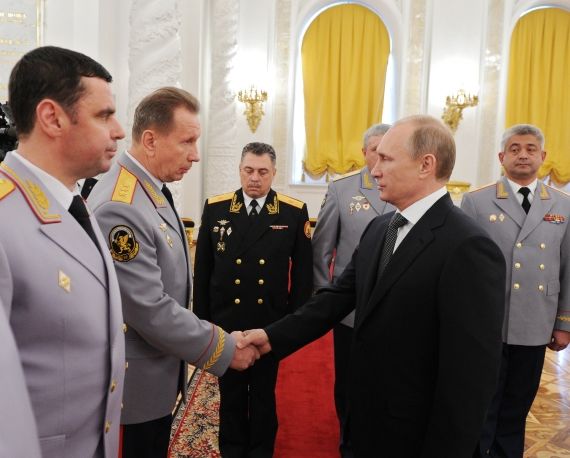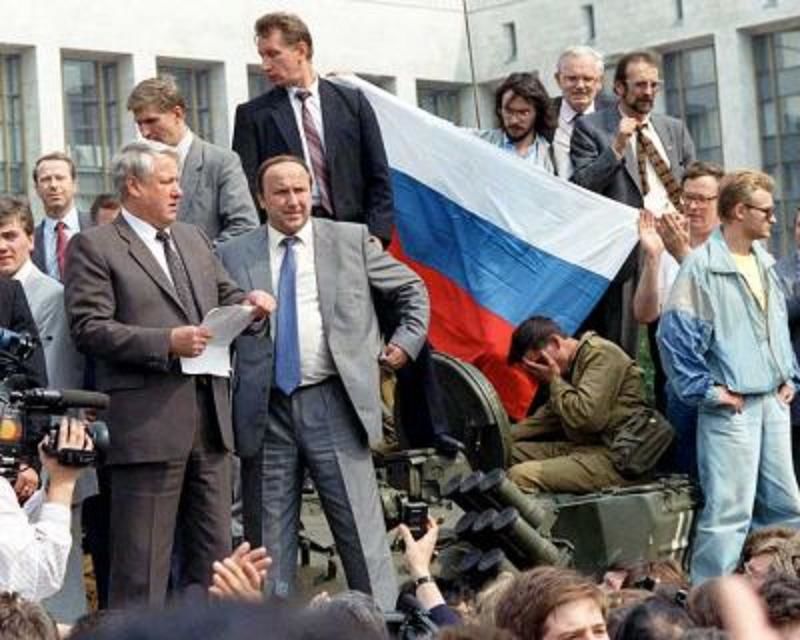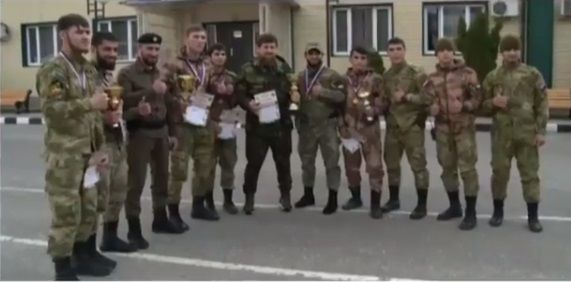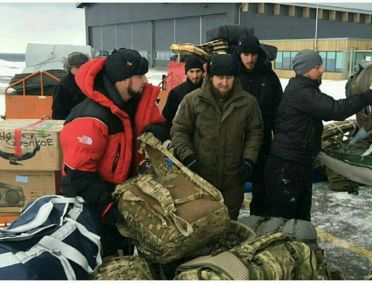LIVE UPDATES:
Welcome to our column, Russia Update, where we will be closely following day-to-day developments in Russia, including the Russian government’s foreign and domestic policies.
The previous issue is here.
Recent Analysis and Translations:
– Getting The News From Chechnya – The Crackdown On Free Press You May Have Missed
– Aurangzeb, Putin, Realism and a Lesson from History
– Why the World Should Care About the Assassination of Boris Nemtsov
– How Boris Nemtsov Was Murdered: Investigation by Novaya Gazeta
– How Stalin Returned to Russian Contemporary Life – Meduza
UPDATES BELOW

President Vladimir Putin’s announcement of the formation of a new “National Guard” under Viktor Zolotov has set many Russia-watchers scrambling to make sense of the move involving a figure who is likely his closest associate.
Translation: !!! Putin appointed his former bodyguard to command the National Guard.
The exclamation points come from the sense of this independent Russian media site that Putin is going further than ever in drawing the ranks of his closest associates around him at a time of economic crisis, where the Kremlin is now involved in three wars: in Ukraine, where fighting has only increased in recent weeks; in Syria, where the much-ballyhooed draw-down of Russian forces did not quite take place; and now in Nagorno-Karabakh, a “frozen conflict” from the Soviet era with its own internal dynamics but one which Moscow has exacerbated and benefited from.
Actually, Zolotov already had a big boost, as we reported in 2013, when he was moved from the head of the Federal Protective Service (FSO), which guards the president and other high officials and the Kremlin grounds and holds the nuclear suitcase, and was made first deputy commander of the Interior Ministry’s Internal Troops and then later was made commander-in-chief.
That might sound like a demotion to some, but as Paul Goble wrote in Windows on Eurasia in 2014, in fact this highly-trusted individual was taking over the silovik muscle that is Putin’s bastion of power, increasing their role in public life but also heightening their competition:
In an essay on Politcom.ru May 19, 2014, Tatyana Stanovaya of the Moscow Center for Political Technologies identifies three trends, each of which she suggests calls attention to both these aspects of the role of the force structures in Putin’s Russia and collectively suggest that Putin is seeking to prevent any one of these structures from acquiring unquestioned dominance.
The first trend, Stanovaya suggests, is “the exit of cadres from the Federal Protective Service. In July 2013, Viktor Zolotov, then head of that institution, was sent to head the Internal Forces. Some treated that as an honorable retirement, but others saw it as providing him with a new launching pad.
Now, the analyst says, “it has become known that Zolotov not only became commander in chief [of those forces] but also first deputy minister,” unlike his predecessor who was only a deputy minister. Zolotov, Stanovaya reminds, has been close to Putin since the latter’s 1990s days in St. Petersburg.
While the Federal Protection Service had gone into eclipse during the presidency of Dmitry Medvedev, its people are now engaged in “an active cadres expansion,” one that recalls the events of 1983 when cadres from the KGB filled [the top ranks] of the Ministry of Internal Affairs” of the Soviet Union.
Putin made Zolotov commander of the Internal Troops in 2014 and elevated him from the rank of colonel to general in 2015, Ilya Yashin, an opposition member wrote citing an expert on intelligence, Boris Volodarsky, who said Zolotov “entered Putin’s closest circle” during his two presidential terms
It is officers of these troops who fought two wars in Chechnya in the 1990s and today are used to combat terrorism in the North Caucasus or who even turn up as “volunteers” at the Donetsk Airport fighting the Ukrainian “Cyborgs.”
In fact, what Aleksei Venediktov, editor-in-chief of Ekho Moskvy said in the Russian tweet linked was that Zolotov was a nebol’shoi drug or “a little friend” of Kadyrov’s, which in most usage doesn’t mean he is an enemy but just the opposite — it is said ironically. (To say he was not a big friend he would write the words separated, ne bol’shoi drug.)
Translation: The head of the National Guard is Kadyrov’s little friend.
The debate about this within Venediktov’s thread and the puzzlement by even some Russians may mean he meant to be ambiguous.
According to Interfax, Putin held a publicized meeting today with Vladimir Kolokoltsev, head of the Interior Ministry (MVD); Viktor Ivanov, head of the Federal Narcotics Control Service (FSIN); Viktor Zolotov, commander of the Interior Ministry’s Internal Troops (MVD VV); and Yekaterina Yegorova, deputy head of the Federal Emergencies Service (MChS). (For some inexplicable reason, Vladimir Puchkov, the head of MChS, was not at the meeting.)
Putin said there were “issues of labor relations with foreigners” that the Federal Migration Service was working out; possibly this was a reference to non-Russians working in these agencies, perhaps from South Abkhazia and South Ossetia, but it is not clear (they have been drafted into the Russian army so it would make sense they could serve in the MVD VV as well.)
Then Putin explained what he meant by the reforms (translation by The Interpreter):
“As for the war on organized crime in the area of the illegal narcotics trade, as we have said, one of the proposals we are implementing: we are transferring the Federal Narcotics Control Service to the Interior Ministry. We discussed this with the minister. I proceed from the premise that this structure will work self-sufficiently, independently, but within the framework of the Interior Ministry.”
As Interfax reported, the draft proposal for these reforms was made two years ago because of redundancy, according to an informed source:
“The idea of subordination of the FSKN and FMS to the MVD is more than a year old. However each time its initiators ran into a fundamental position by the heads of the relevant services, who expressed their disagreement with this proposal.”
As we have seen, Putin assigned the new/old body not just to fight terrorism but crime and fires, for that matter — the Federal Emergencies Service is the agency that has dealt with Russia’s many forest and grass fires particularly in the south and in Siberia in recent years; it takes care of numerous floods; and also the collapses of buildings on people — a chronic problem in Russia.
And of course the suppression of mass demonstrations and civic discontent notably in secessionist republics may be their most important role.
The Interior Troops’ branch in Chechnya are what has been dubbed “Kadyrov’s personal army” and Zolotov indeed is a friend of Kadyrov’s. He last visited him in August 2015 to “inspect the troops” and was received in his home and featured in a video uploaded to YouTube.
It was Zolotov who in 2004 met the distraught Kadyrov, who flew directly to the Kremlin after his father’s assassination, still in a track suit, and drove him to the Kremlin to meet Putin — a meeting which took place at Zolotov’s initiative, Yashin writes.
In discussions about who could be the connection between the will of Putin — or the perceived will of Putin — and Kadyrov and his henchmen and the assassination of Boris Nemtsov, Zolotov is often named as the link.
When last year, Chechnya’s Interior Troops refused to move to allow in officials from the Investigative Committee to interrogate Ruslan Geremeyev, the deputy commander of Sever, an Internal Troops battalion in Chechnya — one of their own implicated in Nemtsov’s murder — Zolotov, who is the superior of the troops loyal to Kadyrov, either was frustrated by their refusal to break ranks or tacitly allowed it — many believe the latter.
So Zolotov isn’t “believed” to be close to Putin; he was close to Putin because he was his personal bodyguard and head of the presidential security service for 13 years. This is especially the case given the Soviet-era concept of rituals and beliefs about “access to the body” as the Russian term describes it — which came to light in the Yeltsin era in his memoirs and biographies of him.
In the command vertical of the Russian presidency, the question of who gets direct access to Putin or requires his signature is tightly controlled as it would be in any country but in Russia, that vertical is very steep and the lack of autonomy among its subordinates only deepening.
So essentially Putin’s plan — which has been covered in the form of some speculation by independent media — was to take this very trusted lieutenant, send him out to take charge of the troops Putin relies on to keep power, then bring him back in to rule the troops — and the thematic “drugs and thugs” agencies more openly.
In December 2014, Boris Nemtsov wrote in puzzlement on his Facebook page about why Putin would allow his power to rest on a peripheral army of a former warlord in a breakaway republic. He thought it was strange and terribly risky, given many centuries of Russian history where tsars and commissars put down rebellions in this region even if it selected some of their promising people as close comrades (like Ruslan Khasbulatov, the speaker of parliament during the Yeltsin era, or Vladislav Surkov, the “Kremlin cardinal” who comes from a Chechen heritage).
But in fact, as events after Nemtsov’s own assassination by these same forces and the announcement today indicate, the “personal army” is the end link of a vertical chain controlled by Zolotov on behalf of Putin — indeed they cooperate intimately. This amalgam is what keeps at bay other threats to Putin, whether others from the former KGB where he served or from the prosecutor’s office and Investigative Committee. The army is seldom mentioned as a threat in these discussions because traditionally, it has not been a seedbed of rebellion in Russia.When the August coup was put together, it was the KGB chief who led it with some conservative Communist Party leaders; while there were army generals in the Committee for the Emergency Situation (GKChP) of that time, the army units broke away from the coup-plotters and expressed loyalty to Yeltsin.
He said that it was to consolidate power, balance out the competitions among the FSB versus the Interior on the one hand and the Investigative Committee and the Prosecutor General’s Office on the other:
As Jensen wrote in 2013:
At an individual level, the Zolotov appointment also may strengthen the checks and balances among the siloviki leaders. If he is effective, Zolotov could balance Kolokoltsev or Defense Minister Sergei Shoygu, the second-most popular political figure in the country, who is sometimes mentioned as a successor to Putin. Zolotov might also counterAleksandr Bastrykin, the powerful head of the SK.
Infighting in the power ministries notwithstanding, Zolotov’s appointment reflects the broader increase in siloviki influence since Putin has returned to the presidency. The siloviki have played the central role in Putin’s struggle with street protesters and politically active citizens, the containment of elites, and the crackdown on civil society. The result has been a short-term success: it has marginalized the liberal social base in the country. But while this drive has mobilized Putin’s core supporters—chiefly nationalists and those in the regions—it has also narrowed it. The president’s political base now comprises no more than 20 percent of the Russian population.
Putin made Zolotov the deputy commander of the Interior Troop forces in 2013. When Putin disappeared from the public eye for some weeks in 2015, Zolotov disappeared along with him and was even rumored dead, but not long after his boss surfaced looking as if he might have had a Botox touch-up, Zolotov fetched up a military rest home handing out awards to wounded warriors.
This scene is from the day President Boris Yeltsin stood atop a tank in the defeat of the August 1991 coup. He was not alone on that tank, however; next to him was his own controversial bodyguard and chief of security, Aleksandr Korzhakov, a KGB officer who had previously protected Soviet-backed Afghan leader Babrak Karmal, who took the job with Yeltsin by breaking the strict rules of his agency, but ultimately was removed from that position by Yeltsin himself after pleading by the liberals in his administration.
But above both of them was Viktor Zolotov, looking around to the left and right like any professional bodyguard.
Putin is not the first leader to face this balancing act; the events of today all had their antecedent in the 1980s, when Leonid Brezhnev refashioned the police into the Interior Ministry and put his crony Nikolai Shchelokov and charge and gave his son-in-law Yury Churbanov a top post.
But when Brezhnev died, his successor Yury Andropov, former KGB chief, found many “violations of socialist legality” in the ranks of the people who themselves were supposed to maintain law-and-order and put a KGB man in charge of the police, Viktor Fedorchuk. There was a massive purge of police that has never been forgotten by the men in blue, and also worsening human rights violations with more arrests of dissidents. The tales of lavish mansions, luxury yachts and jewels of that era are echoed again today, and Putin is reaching for the same solutions.
The expressions on the faces of these Interior Ministry officials may tell us more than the state media; there are rumors that some 80% of the personnel in the Federal Narcotics Service may be fired. Back in January, Vedomosti wrote of the problem of “what to do” with 7,000 people.
There’s more to this already complicated story that indicates more complexity.
When Putin originally created Russia’s first anti-narcotics agency in 2002, called the State Committee to Combat Illicit Trafficking in Narcotic Drugs and Psychotropic Substances, he placed it under the Interior Ministry and put Viktor Cherkesov in charge. It was renamed in 2004 to the Federal Narcotics Control Service; in 2008 Cherkesov was dismissed and President Dmitry Medvedev appointed former KGB general Viktor Ivanov as director.
Cherkesov was an old associate of Putin’s from law school in St. Petersburg and then the KGB, where he headed the St. Petersburg Directorate of the FSB, the KGB’s sucessor. He worked directly under Putin when Putin was director of the FSB for a time until he became president; Putin them assigned him to be the presidential envoy to the Northwestern Federal District before putting him in charge of the drug agency. His wife, Natalya Chaplina, is director general of RosBalt and former editor of Chas Pik.
Medvedev then fired Cherkesov and Putin then put him in charge of arms procurement.
In 2007, Cherkesov wrote a famous article in Kommersant criticizing inter-agency rivalry as undermining Russia and proposing a corporativist security state structure to solve that problem; in some ways, what we see today is that sort of vision.
The late Vladimir Pribylovsky wrote at the time that the poisoning deaths of two drug enforcement officials was part of this inter-agency struggle. The “Cherkesov Clan” is still feared today.
Zolotov’s past includes a number of dramatic incidents, according to the defector Sergei Tretyakov.
Zolotov served in the private security firm Baltik-Ekskort when Roman Tsepov, St. Petersburg businessman and confidante of Putin, died of poisoning. This security firm also protected mayor Anatoly Sobchak, under whom Putin served while Sobchak was mayor of St. Petersburg and who was ostensibly helping Sobchak with his election campaign when Putin later had a higher job in Moscow – although Sobchak’s mysterious death is believed to be associated with Putin by some.
As can be seen, a lot of high matters of state and person protection of Putin are in the hands of the 68-year-old Zolotov now. It remains to be seen where there may be challenges to this new configuration or whether it will continue its brutal course.
— Catherine A. Fitzpatrick

“They came to visit, to get advice. It was an exchange of experience; you have gone through all that, how should we be, what should we do.
I also conveyed to them: what are you doing, are you coming to power, really? You are killing your people for the sake of power? In Syria, there was a normal government, a democratic one. I asked them: what are you lacking? They said: yes, yes, we didn’t wait, we were used, we were led into error. Opposition members have personal ambitions. I believe that they need to be told: your mission is ended, now you must go home or somewhere else. Then it will be easier. If there is something human in them.”
“Because the Arabs, who are also fighting there, and those of other nationalities, put the Chechens first as cannon fodder: you have practice, you have experience, go ahead, Chechen, fight.”
“In Russia, they didn’t know yet, and I didn’t know, that this organization would be called ISIL. There was information that they were preparing some sort of terrorist groups. There were instructors there from the NATO states. Intelligence agents form Chechnya were infiltrated into these camps. I especially sent my people there to check to what extent this was true. And our guys went through recruitments at NATO bases.”
The film narrator says Kadyrov sent to Syria the “best fighters of the republic” who gathered information about the structure of ISIS, the number of terrorists, and their targets for bombing as well as their recording of the results.
No names were given in the show, as everything is classified just as with “99% of the information about Russia’s Syria operation.” Kadyrov repeatedly makes the point that he is talking not about Chechen spetsnaz, but about a Russian division.
Russia began a bombing campaign in Syria on September 30, 2015 and then announced a withdrawal of troops on March 14, although in fact much of its forces remain and bombing of towns continues.
Kadyrov continues to feature what is sometimes called “his personal army” on his Instagram account. These are the Internal Troops of the Chechen branch of Russia’s Interior Ministry. This week, Kadyrov posted a clip of himself in combat fatigues visiting a special cadet training camp in Chechnya for “31 close relatives.” The unit is headed by Internal Troops officer Abdul-Kerim Karymov.
Meanwhile, Kadyrov’s trusted aide Danil Martynov, a Russian spetsnaz trainer who previously served in the elite Alfa group in Moscow, has landed at Svalbard, the Norwegian archipelago in the Arctic where Russia has residence rights and which was the site of an incident with Vice Premier Dmitry Rogozin last year who is under EU sanctions and should not have landed there.
Russia has been keen to maintain its presence in Svalbard and the Arctic in general; Martynov is slated to plant the Chechen flag there.
The following headlines have been drawn from RBC, Gazeta, Grani, and Lenta.
— Catherine A. Fitzpatrick



